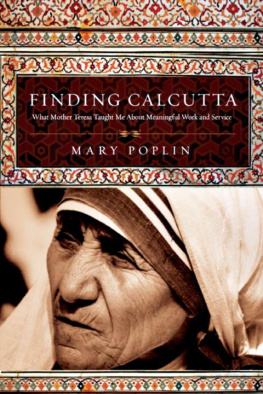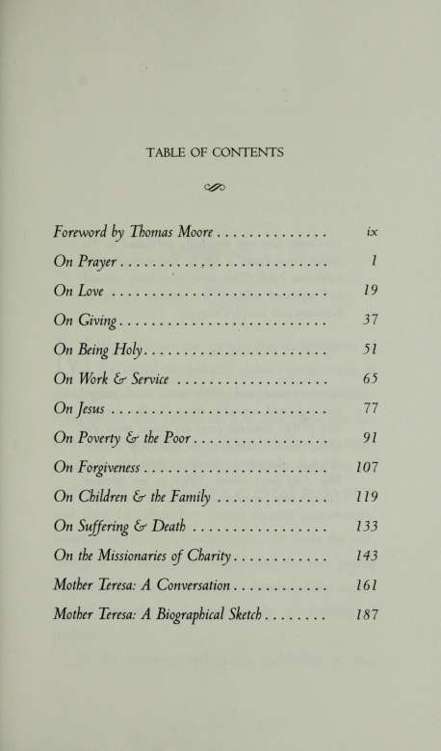This book made available by the Internet Archive.
From the moment a soul has the grace to know God, she must seek.
Mother Teresa
No Greater Love was originally published as The Mother Teresa Reader, A Life for God } compiled by LaVonne Neff. This new, completely revised and updated edition was edited by Becky Benenate and Joseph Durepos.
Q2?0
Scripture texts used in this work, unless otherwise indicated, are taken from The New American Bihk (NAB). Selected texts are taken from The Revised Standard Version of the Bihk (RSV). Some scripture quotations are taken from the Holy Bihk: King fames Version (KJV), or are Mother Teresa's own paraphrases.
FOREWORD
Mother Teresa has caught the imagination of the world not because she is a great writer or theologian, but because she is a person of immense compassion and openness. On one level she has been receptive to her calling, led first by inner promptings to enter a convent, then to focus her life work clearly and exclusively on service to the poor, and then to create her own religious community. Because of her undefended state, she feels the suffering of the world, of the old and the very young and those between. She knows firsthand the meaning of empathy and more so the profundity of pathos.
In the intimate reflections published in this
MOTHER TERESA
book, we learn some of the secrets of this person, often publicly recognized as small in physical stature but great in spirit, who stops to care precisely for those whom the world in general neglects. Her particular kind of Christianity, with its spiritual vision, methods of prayer, and inspiring figure of Jesus, she tells us, keeps her personal spirits and her unlimited compassion high.
To a sophisticated modern reader, some of her ideas and language, especially her piety, may seem naive and unnecessarily self-denying. As I read her thoughts, I'm led back in memory to my own early school days when I was taught by nuns to "mortify the body and the senses." But there is indeed wisdom in finding ways to silence the busy life and to become less preoccupied with self. For Mother Teresa, apparently her lifelong habit of quieting her ego through prayer has led to a vibrant life in the world and the rich development of her personality. Modern psychology has yet to discover what the religions have taught for millennia that loss of self leads to the discovery of soul.
As I read her words, I try to hear them not as naive, but as sophisticated in a way that is largely
No Greater Love
foreign to modern taste. Rather than avoiding suffering, she becomes intimate with it. Rather than heroically trying to overcome death, in the style of modern Western medical philosophy, she focuses her attention on a person's emotional state and sense of meaning in the last moments. She is acutely attentive, too, to the feelings of children, a strong sign, in my estimation, of a person profoundly initiated in the ways of the soul.
In current psychological jargon, insight, self-awareness, and working on one's life are central in the project of becoming a self. But Mother Teresa could teach psychologists a thing or two, as when she tells the story of a woman who underwent profound personal change when, on Mother Teresa's astute advice, she began to wear less expensive dress. Beneath Mother Teresas straightforward faith and personal honesty lies a subtle knowledge of human motivation.
Some readers might find Mother Teresa's Christian faith, so unapologetically presented m the language of love and prayer, an obstacle. Anxious, defensive, and proselytizing religion swirls around us daily, to the point that many find an institutional
MOTHER TERESA
religion repugnant. To those readers I would suggest that they let go of certain literalistic and infantile meanings that they may attach to theological language, and hear the challenging message that Mother Teresa evidently senses in her faith. I can read a Buddhist exhorting me to see the Buddha-nature in an animal in much the same way I can be
j
encouraged by Mother Teresa to see Jesus in a dying man or the mystical body of Christ m the community of humankind.
Too often religion is imagined and lived as a purely spiritual activity, sometimes as a mental exercise in belief and explanation. In Mother Teresa's life and words we find religion's soul, in the sense that her faith is inseparable from her compassion, and her compassion is never disconnected from her behavior. In a purely spiritual religion, a follower may profess beliefs loudly and intolerantly I don't see much service to the poor and sick among those who would like us all to adopt their beliefs. When religion is largely mental, spiritual attitudes may never get translated into compassionate action in the world community.
What is absent in these passionate words of
XI l
No Greater Love
Mother Teresa is any attempt to convert us to her beliefs. She simply describes her strong faith and tells us about her work with the poor and the sick. Her stories are obviously not meant to convince us of her religious convictions; rather, they simply demonstrate how human beings, when given the most basic kinds of love and attention, find significant transformation and discover their humanity, dignity, and at least momentary happiness.
Many describe Mother Teresa as a rare "living saint." I appreciate that sentiment. We need saints, just as we need some of the old words such as sin, grace, faith, and evil. Once, we could reflect on our experience philosophically and theologically; today we have reduced all analysis of our situation to the psychological, the sociological, and the political. These reductive ways of thinking render experience more narrow and superficial, while they give the illusion that if we could only become thoroughly hygienic we'd be free of our problems.
Mother Teresa doesn't speak or work within such a limited social scientific framework. Prayer and dedication are still relevant to her, and in them she finds her values and her life work. Thinking of
MOTHER TERESA
her as a saint, we might consider her example impossible for us to emulate, but the reflections she captures in this book could show us, as she says, that we can all be saints not without our imperfections and follies, not without our need to confess to fallings daily, but nevertheless dedicated to the community of people, especially those m distress, who make up our family, our neighborhood, and our world.
Thomas Moore
author of Care of the Soul and
Re-Enchantment of Everyday Life
January, 1997
No Greater Love
On Prayer
C^D
Prayer is in all things, in all gestures.
Mother Teresa
Why are you sleeping? Wake up, and pray...
Jesus to the disciples asleep in the garden, luke 22:46 nab
q^D
I don't think there is anyone who needs God's help and grace as much as I do. Sometimes I feel so helpless and weak. I think that is why God uses me. Because I cannot depend on my own strength, I rely on Him twenty-four hours a day. If the day had even more hours, then I would need His help and grace during those hours as well. All of us must cling to God through prayer.
Next page














